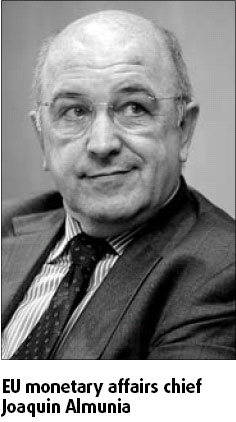EU predicts growth, inflation woes
The European Commission cut its forecast for economic growth in the euro area and predicted the strongest inflation since the start of the single currency, highlighting the dilemma facing the region's central bank.
The economy of the 15 nations that share the euro will expand 1.8 percent this year, the Brussels-based commission said yesterday, 0.4 percentage point below the rate predicted in November and the weakest since 2005. Inflation will average 2.6 percent, up from the previous estimate of 2.1 percent, the fastest since the euro was introduced in 1999, it said.
The combination of weakening expansion and rising inflation complicates the work of the European Central Bank as it seeks to insulate its economy from a US slowdown without surrendering its campaign to restrain price pressures.
"The risks to the growth outlook are mainly on the downside," European Union Monetary Affairs Commissioner Joaquin Almunia told reporters in Brussels yesterday. "We are now suffering this hump of higher inflation."
The ECB releases new forecasts on March 6 having said in December it expected expansion of about 2 percent this year.
The US slowdown is combining with costlier credit, oil prices about $100 a barrel and a rising euro to curb expansion, the commission said. At the same time, the higher energy prices and more expensive food are fanning inflation.
Such risks prompted ECB President Jean-Claude Trichet to this month warn that stronger inflation and weaker growth were both risks to the economy, reversing his previous view that price pressures were the greatest threat. The central bank has left its benchmark interest rate at a six-year high of 4 percent since June.
Agencies
(China Daily 02/22/2008 page17)














